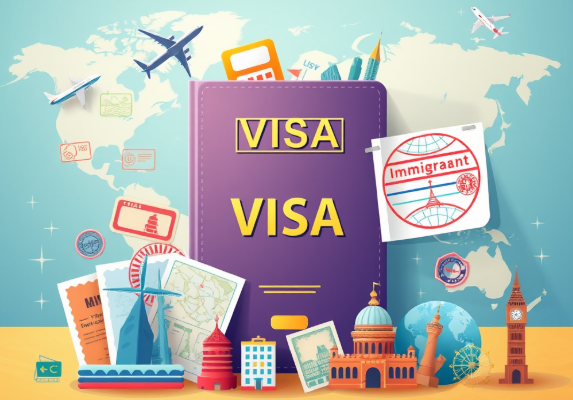India, a country rich in culture, history, and diversity, attracts travelers from around the world. For Surinamese and Eswatini citizens, navigating the visa application process can seem daunting. This blog post aims to provide a comprehensive guide to obtaining an Indian visa, ensuring a smooth journey for travelers from these two nations.
Understanding the Indian Visa Types
Before applying for an Indian visa, it is crucial to understand the various types available. India offers several categories, including tourist, business, student, and medical visas, among others. Each type serves a specific purpose and comes with its own set of requirements. For Surinamese and Eswatini citizens, the most common visa types are tourist and business visas. A tourist visa is ideal for those looking to explore India’s vast landscapes and rich heritage, while a business visa caters to individuals traveling for commercial purposes.
Eligibility Criteria for Surinamese and Eswatini Citizens
To qualify for an Indian visa, applicants must meet specific eligibility criteria. Surinamese and Eswatini citizens should ensure they possess a valid passport with at least six months of validity remaining. Additionally, applicants must have a confirmed return ticket, proof of accommodation in India, and sufficient financial means to support their stay. It is essential to gather all necessary documentation before applying to avoid any delays or complications. INDIAN VISA FOR SURINAMESE CITIZENS.
The Application Process
The visa application process for Surinamese and Eswatini citizens involves several steps. First, applicants should visit the official Indian visa website or the nearest Indian embassy or consulate. Online applications are often more convenient and allow for quicker processing. After filling out the application form, it is important to review all information for accuracy.
Once the application is submitted, applicants will need to pay the visa fee. The fee varies based on the type of visa and the duration of stay. After payment, applicants may need to schedule an appointment for biometric data collection, which typically includes fingerprinting and a photograph.
Required Documents
When applying for an Indian visa, specific documents must be submitted along with the application form. Surinamese and Eswatini citizens should prepare the following:
A valid passport with at least two blank pages
A recent passport-sized photograph
Proof of accommodation, such as hotel bookings or an invitation letter
A copy of the confirmed return ticket
Financial statements or proof of funds
Any additional documents relevant to the type of visa being applied for, such as business letters or medical documentation
Ensuring all documents are correctly submitted can significantly expedite the processing time.
Processing Time and Fees
The processing time for Indian visas can vary. Generally, it takes anywhere from 3 to 7 working days, depending on the type of visa and the volume of applications being processed. It is advisable for travelers to apply well in advance of their intended travel dates to accommodate any unforeseen delays. INDIAN VISA FOR EMASWATI CITIZENS.
Visa fees also vary based on the visa type and duration of stay. Surinamese and Eswatini citizens should check the latest fee structure on the official Indian visa website or through the embassy. Payment methods may differ, so it is essential to follow the instructions provided during the application process.
Tips for a Smooth Application Experience
To enhance the chances of a successful visa application, travelers should follow a few practical tips. First, ensuring that all information provided in the application form is accurate and consistent with the supporting documents can prevent delays. It is also wise to maintain a copy of all submitted documents for personal records.
Travelers should remain updated on any changes in visa policies or requirements, which can occasionally occur due to diplomatic relations or global events. Additionally, contacting the embassy or consulate for clarification on any doubts during the application process can be beneficial.
Frequently Asked Questions (FAQs)
What is the validity period of an Indian tourist visa?
The validity period for an Indian tourist visa typically ranges from six months to five years, depending on the specific visa granted. It is essential to check the validity at the time of application.
Can Surinamese or Eswatini citizens apply for an e-Visa?
Yes, both Surinamese and Eswatini citizens are eligible to apply for an e-Visa for India, which simplifies the application process. E-Visas are available for tourism, business, and medical purposes.
Is it necessary to visit the embassy for the visa application?
While many applicants can complete the process online, some may need to visit the embassy for biometric data collection or specific documentation verification. It is advisable to check the requirements based on individual circumstances.
How can I track my visa application status?
Applicants can track their visa application status online through the official Indian visa website. A tracking number is usually provided upon submission, allowing for easy monitoring of application progress.
What should I do if my visa application is rejected?
If a visa application is rejected, the applicant will typically receive a reason for the denial. It is crucial to review the reasons carefully, address the issues, and consider reapplying. Consulting the embassy for guidance can also provide clarity on the next steps.
Conclusion
Obtaining an Indian visa as a Surinamese or Eswatini citizen may seem complex, but with the right information and preparation, the process can be straightforward. By understanding the types of visas available, meeting eligibility criteria, and following the application process diligently, travelers can embark on their journey to India with confidence. Whether exploring the vibrant cities or the serene countryside, India promises an unforgettable experience for all who visit.






